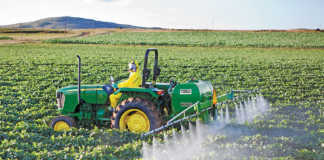“But we need hard, penetrating rains before the end of November so we can at least relieve the restrictions somewhat, otherwise the valley’s farmers will be facing disaster,” he said. Farmers were only allocated 40% of their annual water quota for this year due to the ongoing drought.
“A farmer’s life is about risk and that’s why they feel they should continue as normal, hoping for rains to fill the dam,” said Joubert. “If they don’t risk, they don’t have much chance of survival. But they should always use water as sparingly as possible, even in their households.”
Farmers in the area haven’t lost hope. Merwe du Preez (82) of Kwaggaskloof, who was born and bred in the valley, said a farmer without a positive attitude shouldn’t be farming. “Such a farmer will never survive what we’re going through now and would’ve quit a long time ago,” added Du Preez, who is also chairperson of the Gamtoos Irrigation Board.
Du Preez said farmers are planting cash crops as they would have done in a good year, in the hope that it will rain before it’s too late. “If you don’t plant anything and it rains you’ll lose big time, but if you do plant and it doesn’t rain, you’ve at least tried something.
“In the valley, we’ve learnt how to save water and use it as sparingly as we can. By implementing improved technology we’ve also cut back considerably on water losses.
“A few years ago our annual losses stood at 22%. Now they hover at about 8% per year, which makes a huge impact on our water reserves. It’s now extremely important to keep to the restrictions and not to use too much water on cash crops, saving enough to keep our citrus trees going as well.”
Gamtoos Farmers’ Association chairperson Petrus du Preez said that although they’ve planted fewer vegetables than usual, they could still harvest good crops if they use water efficiently.
“I’m sure this will be the case as we’ve learnt to appreciate water a lot more than we have in the past,” he said. “You hope it’ll rain in August. When it doesn’t, you believe it’ll rain in September, and it continues like that until we get the rains.
“Some farmers have drilled for water, and although it was found to be brackish, it’s still better than no water.”











